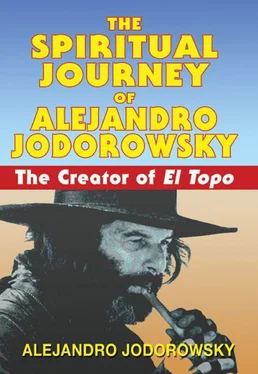I wandered around the dark house like a disembodied shadow. Leonora, her husband, her two children, and the dog were all sound asleep. No one was disturbed by my presence, which seemed utterly natural to them. Either I did not exist for them or I had become a ghost — or perhaps just one more of the dolls. I glided from room to room, living a long-held fantasy of mine: to become an invisible man and observe others in their intimacy without any interaction between us. In the master bedroom, lit by a lunar light, I saw a large oil painting: a portrait of Leonora by Max Ernst. Very young and beautiful, she wore a dark green dress blown by the wind and seemed to be on the lookout in the midst of a forest of black trees.
Young Gaby was sleeping next to a pyramidal pile of poetry collections, arms wrapped around a wooden princess who wore a crown shaped like a half moon. Upon young Pablo’s desk was a candy box, and pinned on it was the cadaver of a large toad, its belly sliced open so that its entrails were exposed. Several scalpels and other surgical instruments were lying on his bookshelves along with some instruction books on the techniques of taxidermy. Eldra, half awake and drowsy, lay on the couch between the two Anubises, gnawing contentedly on a small statue of the Virgin of Guadalupe.
Down on the humid ground floor I discovered a photography lab. Its walls were covered with photos of baptisms, First Communions, birthdays, marriages, and funerals. This was how the antisocial Chiki earned his living: taking photographs of groups of people who all seemed to have the same face. When looked at together, these photographs gave the impression of an anthill.
As the darkness gave way to daylight, I ceased to be a shadow. Ill at ease in my dense body, I returned home.
Three days passed, during which I could do nothing. I spent hours lying in a hammock, allowing my mind to ruminate cowlike upon my experiences in this household, where people lived by laws that were not those of reason.
Then I was awakened at five o’clock in the morning by a phone call from Leonora. She spoke very fast in a low, conspiratorial, almost whispering voice.
“Your name is no longer Alejandro. It is now Sebastian. Beware! They are watching us. To seal our union, we must commit a sacred misdeed. Get up now and rent a room at the Hotel Reforma. [Some years later, this building would be destroyed by an earthquake.] Do not accept any room but number 22. Don’t worry, for according to the laws of St. Random, this room will be free. Come dressed in black, as if in mourning.”
Then she hung up abruptly without waiting for any response from me.
I took a bath, washed my hair, and put on some scent, clean underwear, and a black suit that had recently been returned from the cleaners. On the way to the hotel, I bought a dozen red roses. Overcoming an attack of timidity but clearing my throat like a guilty person, I demanded room 22. I had no hope of getting it, for the hotel was packed with people attending a horsemanship convention. To my great surprise, room 22 was the only vacancy. I settled in, strewing the roses along a counterpane with multicolored stripes. I closed the curtains to hide the ugliness of the room, lighting only the small bedside lamp, which I covered with a pillowcase in such a way as to cast a discreet, rosy aura in the room. Every five minutes I washed my hands, which were sweating profusely. My genitals were filled with a deathly cold. Any erection seemed totally impossible. I felt castrated by ancestral fears of maternal incest. I thought of Ejo. I took up a position of meditation, intoning “om” constantly, emptying my mind of every other word.
At exactly nine o’clock, seven soft knocks on the door announced Leonora’s arrival. I tried to hurry over to open the door, but my legs had gone to sleep. I dragged myself as best I could, stumbling and shaking my feet to restore circulation, and with a dry mouth, I opened the door.
It was a new Leonora who stood facing me. She was dressed completely in black, like me, except for green leather shoes. Her head was covered with a veil. She glided into the room with the grace of a fifteen-year-old girl. Her voice had also changed: she spoke no longer in the low tones of a priestess, but instead assumed a musical voice full of enchanting shyness. She bore two cubical boxes, one wrapped in silver paper, the other in gold. After I closed the door, she made sure it was properly bolted as well. Then, in a murmur, she asked me to remove her veil. Slowly, with trembling hands, I did. For the first time, I saw makeup on her face — discreet, but sensual. In her carefully coiffed hair there were five authentic green scarab jewels.
We sat on the edge of the bed. I soon realized that any suspicions I harbored of sexual intentions on her part were totally unfounded. The misdeed she spoke of had nothing to do with adultery. I breathed a sigh of relief. What I felt for her had nothing to do with sexual or romantic desire. My soul wanted to unite itself with hers. My rational consciousness wanted to drown in her limitless spirit. What I truly desired was to taste the soma of holy madness.
Leonora opened her boxes. From the golden one she took a skull made of sugar — the kind Mexicans use on the first day of November, Día de los Muertes. It had ALEJANDRO engraved on its forehead. From the silver box she took another skull engraved with LEONORA. She gave me hers and kept the one with my name.
“Now we shall devour each other,” she said, and bit into the skull with my name. I did the same with hers. Our eyes were fixed on each other, and we seemed to forget everything — the world and even ourselves — as we ate the skulls slowly. For an instant her face disappeared, and I saw my own in its place. At this moment, as if sharing the same hallucination, she said, “From now on, your face is my mirror.”
When we had finished this strange breakfast, she put a finger on her lips as a sign for me to be silent, donned her veil, placed one of the scarab jewels on my hand, and with no further ado, opened the door and left.
The next day, Kati Horna brought me a letter, saying: “This is from Leonora. If you open the door to her house, I implore you not to let in any bees, because they come from Venus. They can transform her into a woman. If, by misfortune, you make her cry, you must realize that her tears are not liquid; they are of hard, frozen ice armed with geometrical points that can make her go blind.”
Along with the violet envelope, she gave me a small wooden doll: a bearded goddess with horns. Reaching into a deep pocket of her large skirt, she gave me a fish of the variety known as huachinango in Mexico. Then she took a photograph of me and backed away, disappearing.
With trembling hands I read:
Long ago your naked footprints already sketched out the labyrinth in front of you, which is your path. Listen: By absolute necessity, I rediscovered my mother, the Spider. She offered her multiple hairy arms to my tongue. On each hair, a drop of honey glistened. “Lick!” she commanded. I obeyed. Then she gave me her web to dress my shadow and yours. Come!
I ran all the way to her house. I was utterly fascinated by Leonora’s mind. In her universe, thought was so concentrated that it was transformed into a dark stone submerged in the phosphorescent ocean of an unconscious with no barriers. A multitude of feelings and strange beings inhabited its depths: joys such as earthquakes, anguishes and terrors disguised as beautiful husks, angels as delicate as endless threads, repulsive yet comic.
Hidden in the folds of the envelope, I found an additional detail:
I have discovered the marvelous qualities of my shadow. Lately it has been detaching itself from me by virtue of its powers of flight. Sometimes it leaves wet footprints. But I confess: I constantly sleep wrapped in it, and the moments when I am able to awaken are rare.
Читать дальше












